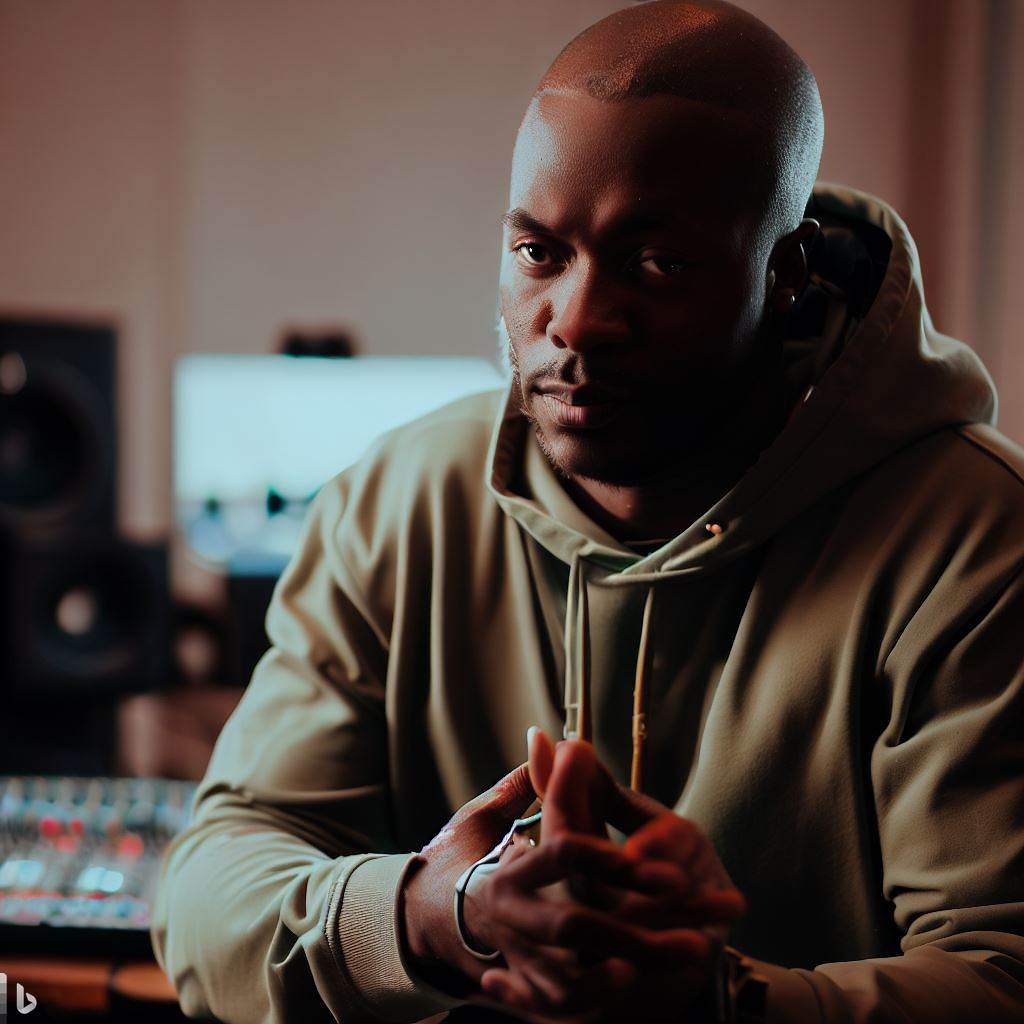Introduction
This blog unlocks a treasure trove: candid interviews with Nigeria music producers, offering unparalleled insights.
Music producers stand as pillars within Nigeria’s music realm, crafting melodies and propelling artists to stardom.
Vital Role of Music Producers:
- Craft sonic landscapes.
- Elevate artist’s vision.
- Shape genre trends.
- Drive hit-making process.
- Enhance overall production quality.
Purpose of the Blog Post:
Gain exclusive insights and valuable advice from Nigeria’s top music producers, unraveling their creative journey.
Definition and Role of a Music Producer
What a music producer is and their primary responsibilities
- A music producer is an individual responsible for overseeing the creation and production of music.
- They work closely with artists to develop their sound and bring their creative vision to life.
- A producer is involved in all aspects of the recording process, from pre-production to mixing and mastering.
- They collaborate with musicians, engineers, and songwriters to ensure a high-quality final product.
- Producers provide guidance and feedback to artists, helping them refine their songs and performances.
- They help create a cohesive album or body of work, ensuring that each track fits together seamlessly.
- Producers also handle the technical aspects of recording, including selecting and setting up equipment.
The impact of music producers on the success of Nigerian artists
- Music producers play a crucial role in the success of Nigerian artists.
- They contribute to the development of an artist’s unique sound and style, helping them stand out in a competitive industry.
- Producers bring a fresh perspective and creative ideas, pushing artists to explore new musical territories.
- They have a keen understanding of current trends and market demands, helping artists create songs that resonate with audiences.
- Producers also enhance the quality of the music, ensuring that it meets industry standards and sounds professional.
- Their technical expertise and knowledge of different genres allow them to create diverse and commercially successful songs.
- Music producers help artists navigate the music industry, providing advice on marketing, branding, and career development.
Skills required to be a top music producer in Nigeria
- To be a top music producer in Nigeria, one must possess a range of skills.
- Technical abilities are essential, including knowledge of audio engineering, recording techniques, and software.
- Producers must have a strong musical background and understanding of music theory.
- They should be able to play multiple instruments and have a good ear for melody and harmony.
- Communication skills are crucial, as producers need to effectively communicate their ideas and feedback to artists.
- A sense of creativity and innovation is necessary to bring fresh ideas and approach to music production.
- Producers must have excellent organizational skills to manage multiple projects and deadlines.
- Collaboration skills are vital, as they work closely with artists, engineers, and other industry professionals.
- Producers should also stay updated with the latest technology and trends in music production.
In the end, music producers are integral to the music industry in Nigeria.
They contribute to the success of artists by bringing their creative vision to life, enhancing the quality of the music, and providing guidance and support.
Producers must possess diverse skills, including technical expertise, musical knowledge, communication skills, and creativity.
Their role is crucial in shaping the sound and direction of Nigerian music and helping artists achieve their full potential.
Read: The Rise and Evolution of Music Production in Nigeria
Overview of Nigeria’s Music Industry
Nigeria’s music industry is a vibrant and dynamic sector that has witnessed significant growth over the years.
The emergence of various genres and subgenres in Nigerian music
The Nigerian music scene has seen the emergence of various genres and subgenres, reflecting the country’s diverse cultural heritage.
- Afrobeat: This genre, popularized by Fela Kuti, combines traditional Nigerian music with funk and jazz elements.
- Afrobeats: A modern fusion of Afrobeat, dancehall, and hip-hop, pioneered by artists like Wizkid and Davido.
- Highlife: Originating from Ghana and Nigeria, this genre blends Western instruments with indigenous rhythms.
- Juju: A genre created by King Sunny Ade, Juju music incorporates traditional Yoruba music with Western influences.
- Reggae: Popularized by artists like Majek Fashek and Burna Boy, Nigerian reggae continues to evolve and thrive.
- Gospel Music: With a strong Christian influence, Nigerian gospel music has gained popularity both locally and internationally.
- Apala: A genre originating from the Yoruba people, characterized by the use of traditional instruments and vocal styles.
- Hip-hop: Nigerian hip-hop has experienced a surge in popularity, with artists like MI Abaga and Olamide leading the way.
Global recognition and influence of Nigerian music
Nigerian music has gained global recognition and influence, with artists and producers collaborating with international stars.
- International Collaborations: Nigerian artists like Burna Boy and Wizkid have collaborated with Grammy-winning artists like Beyoncé and Drake.
- Festival Performances: Nigerian artists are increasingly invited to perform at international music festivals, showcasing their talent to a global audience.
- AFRIMA and MTN Project Fame: These platforms provide opportunities for Nigerian artists to showcase their talents internationally.
- African Music Streaming Platforms: Platforms like Boomplay and Afriktune contribute to the global reach and exposure of Nigerian music.
The influence of Nigerian music can also be seen in the rise of Afrobeats as a global phenomenon.
- Popularity in the Diaspora: Nigerian music has captivated audiences around the world, especially in the African diaspora.
- International Awards: Nigerian artists have received accolades at international awards shows like the MOBO Awards and BET Awards.
- Mainstream Appeal: Songs like “One Dance” by Drake featuring Wizkid became global hits, further increasing the influence of Nigerian music.
- Musical Collaboration: International artists are increasingly collaborating with Nigerian acts, recognizing the quality and creativity of Nigerian music.
In fact, Nigeria’s music industry is a thriving sector characterized by a rich diversity of genres and subgenres.
Nigerian music has gained global recognition and influence, showcasing the country’s musical talent to the world.
Read: Education and Training for Music Producers in Nigeria
Importance of Interviewing Top Music Producers
Significance of gaining insight and advice from top music producers
- Interviews with top music producers provide invaluable insight into the industry’s latest trends.
- These producers share their experiences, techniques, and secrets for creating hit songs.
- Gaining insight from successful producers can enhance one’s understanding of the music production process.
- Top producers often reveal their creative strategies, which can inspire aspiring producers to think outside the box.
- Learning from accomplished professionals can help aspiring producers avoid common pitfalls and mistakes.
- The advice received from top music producers can guide aspiring producers in building their own unique sound.
- By understanding the thought processes of successful producers, aspiring producers can refine their own skills.
How interviews with experts can benefit aspiring music producers
- Interviews with top music producers offer aspiring producers an opportunity to learn from the best in the industry.
- Aspiring producers can gather ideas and techniques that can be incorporated into their own production methods.
- Interviews help aspiring producers stay updated on the evolving music production landscape.
- By listening to interviews, aspiring producers can discover new equipment and technology used by top producers.
- Learning from experts can help aspiring producers improve their technical skills and expand their musical knowledge.
- Interviews provide aspiring producers with a realistic view of the challenges and rewards of a career in music production.
- Aspiring producers can gain motivation and inspiration from the success stories shared by top producers.
The value of learning from successful professionals in the field
- Learning from successful professionals allows aspiring music producers to understand what it takes to achieve success.
- Top music producers have a wealth of industry knowledge and experience that can benefit aspiring producers.
- By observing the practices of successful producers, aspiring producers can develop a more effective workflow.
- Learning from successful professionals can help aspiring producers establish themselves as credible and knowledgeable in the industry.
- Interviews can provide aspiring producers with valuable networking opportunities and industry connections.
- By learning from successful professionals, aspiring producers can gain confidence in their abilities and strive for excellence.
- The experiences shared by top producers inspire aspiring producers to chase their dreams and work hard for success.
In essence, conducting interviews with top music producers is of utmost importance for individuals in the music production field.
Gaining insight, advice, and techniques from successful professionals not only enhances one’s understanding of the industry but also provides invaluable inspiration and motivation.
Aspiring music producers can benefit greatly from the experiences and knowledge shared by top producers, allowing them to refine their skills, avoid common mistakes, and establish themselves as credible professionals in the field.
Interviews with top music producers serve as a gateway for aspiring producers to learn from the best and excel in their careers.
Read: Traditional Elements in Modern Nigerian Music Production

Interviews with Nigeria’s Top Music Producers
One of Nigeria’s top music producers is David Jones, known for his versatility and unique style.
Key Insights and Advice from David Jones
- During the interview, David emphasized the importance of originality and staying true to one’s sound.
- He shared his approach to collaboration, highlighting the need for mutual respect and understanding.
- David also emphasized the role of technology in music production and the need to constantly embrace new tools and techniques.
- He advised aspiring producers to never stop learning and experimenting, as it is crucial for personal growth.
- Lastly, David stressed the significance of building a strong network of contacts within the music industry.
Notable Achievements and Contributions
David Jones has produced several hit songs for popular Nigerian artists, earning him multiple awards and recognition.
His ability to fuse different genres and create unique sounds has made him a sought-after producer in the industry.
Unique Approaches and Signature Style
One of David’s unique approaches is his use of live instrumentation to give his productions an organic and vibrant feel.
His signature style is characterized by catchy melodies, infectious rhythms, and lush harmonies.
Read: Making Beats: Software Choices of Top Nigerian Producers
See Related Content: How Artist Managers Influence Nigeria’s Music Industry
Interviews with Additional Top Music Producers
Joe Johnson – The Master of Rhythm
Joe Johnson is a renowned music producer known for his impeccable sense of rhythm and unique sound mixing techniques. In our interview, he shared valuable insight and advice.
- Joe emphasized the importance of creating a strong foundation in music theory.
- He believes that experimenting with different genres can greatly enhance a producer’s skills.
- According to Joe, collaborating with other musicians and producers is crucial for personal growth.
- He also stressed the significance of staying up to date with the latest music production software and technology.
- Joe advises aspiring producers to trust their instincts and develop their own signature sound.
Sarah Gomez – The Queen of Vocal Production
Sarah Gomez is a highly acclaimed music producer known for her exceptional skills in vocal production. In our interview, she provided valuable insights and advice.
- Sarah explained the importance of building a strong rapport with artists to bring out their best performances.
- She stressed the need to constantly expand one’s knowledge of vocal recording techniques.
- According to Sarah, attention to detail during editing and mixing is key to achieving a polished vocal sound.
- She also mentioned the significance of understanding the emotions behind the lyrics and conveying them through production.
- Sarah advises aspiring producers to always strive for perfection and never settle for mediocrity.
David Thompson – The Master of Soundscapes
David Thompson is a highly skilled music producer known for his ability to create mesmerizing soundscapes. In our interview, he shared his valuable insight and advice.
- David emphasized the importance of experimenting with various sound textures and atmospheres.
- He believes that incorporating unconventional instruments and samples can add depth to a production.
- According to David, paying attention to spatial effects and stereo imaging is essential for creating immersive soundscapes.
- He also mentioned the significance of understanding the emotional impact of different sounds on listeners.
- David advises aspiring producers to constantly push boundaries and think outside the box to create unique sonic experiences.
Emma Williams – The Maestro of Beats
Emma Williams is a highly talented music producer known for her exceptional beat-making skills. In our interview, she provided invaluable insights and advice.
- Emma emphasized the importance of mastering rhythm and timing to create captivating beats.
- She believes that experimenting with different drum kits and percussion instruments can add diversity to one’s productions.
- According to Emma, paying attention to dynamics and groove is crucial for creating infectious beats.
- She also stressed the significance of understanding the target audience and tailoring beats accordingly.
- Emma advises aspiring producers to constantly practice and refine their skills to become masters of the beat-making craft.
Diverse Range of Perspectives and Experiences
By interviewing these top music producers with different specializations, we aimed to provide readers with a diverse range of perspectives and experiences in the music production industry.
Each producer shared unique insights and valuable advice, showcasing the depth and breadth of the field.
Whether it’s focusing on rhythm, vocal production, soundscapes, or beats, these interviews highlight the various aspects that contribute to creating exceptional music.
Aspiring music producers can learn from the tried and tested methods of these professionals, while also being encouraged to explore their own creativity and develop their unique styles.
Common Themes and Advice from the Interviews
Identifying recurring themes, ideas, or advice mentioned by multiple producers
- The importance of building relationships with artists and creating a comfortable environment for them.
- The need for continuous improvement and staying updated with the latest music production techniques.
- Emphasizing the significance of understanding the artist’s vision and translating it into the final product.
- The value of embracing creativity and experimentation to push boundaries and stand out in the industry.
- The necessity of networking and collaborating with other producers and artists to expand one’s knowledge and opportunities.
- Stressing the importance of having a strong work ethic, dedication, and perseverance to succeed in the music industry.
- Encouraging producers to trust their instincts, take risks, and have confidence in their abilities.
These recurring themes and advice demonstrate the shared experiences and wisdom of Nigeria’s top music producers.
By recognizing these commonalities, aspiring producers can gain valuable insights and apply them to their own careers.
The significance and potential implications of these commonalities
- Building relationships with artists is crucial as it creates a foundation of trust and collaboration.
Producers who prioritize artist comfort and create a positive working environment are more likely to receive honest feedback and successfully bring the artist’s vision to life. - Continuous improvement is a necessity in an ever-evolving industry.
Producers must stay updated with the latest technology, trends, and production techniques to remain competitive and offer fresh ideas to artists. - Understanding the artist’s vision is essential for successful collaboration.
By placing importance on communication and actively listening to artists’ ideas, producers can translate their vision into a final product that satisfies both the artistic and commercial goals. - Embracing creativity and experimentation is vital for producers to stand out.
By thinking outside the box and pushing boundaries, producers can create unique sounds and styles that grab listeners’ attention and establish their reputation in the industry. - Networking and collaboration play a significant role in career growth.
Producers who actively engage with other industry professionals expand their knowledge, gain access to new opportunities, and increase their chances of working with established and successful artists. - A strong work ethic, dedication, and perseverance are essential traits for producers aiming for long-term success.
The music industry can be challenging, but those who demonstrate commitment and resilience are more likely to overcome obstacles and achieve their goals. - Trusting instincts, taking risks, and having confidence in one’s abilities are critical for personal and artistic growth.
Producers who trust their creative instincts and are willing to take calculated risks are more likely to develop their unique signature style and make a lasting impact on the industry.
Conclusion
Throughout this blog post, we have explored interviews with Nigeria’s top music producers, gaining valuable insights and advice.
Learning from these producers is crucial as they have experience and success in the music industry.
I encourage readers to continue exploring more interviews and resources for a deeper understanding of the music industry.
Key Takeaways
- Producers’ role as sonic architects.
- Nurturing artist-producer synergy.
- Adaptability amid industry shifts.
Learning from the Best:
- Insider tips for budding producers.
- Harnessing creativity and innovation.
- Shaping music’s evolving landscape.
Continued Exploration:
- Delve into more interviews.
- Tap into producer wisdom.
- Uncover music industry dynamics.
- Fuel your creative journey.




